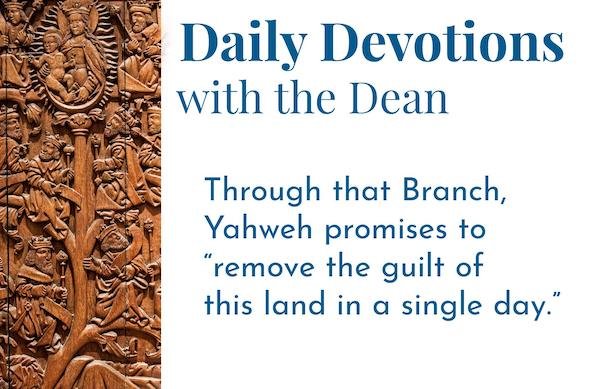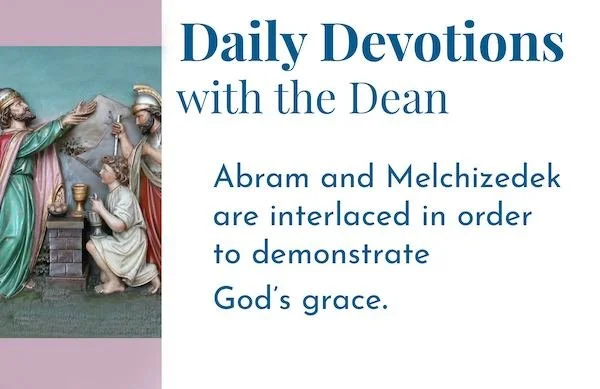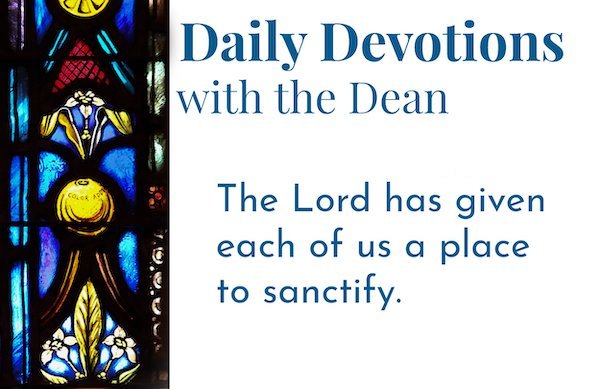Sunday • 12/24/2023 •
Christmas Eve, Year Two
This morning’s Scriptures are: Psalm 45; Psalm 46; Baruch 4:36–5:9; Galatians 3:23–4:7; Matthew 1:18–25
This morning’s Canticles are: following the OT reading, Canticle 10 (“The Second Song of Isaiah,” Isaiah 55:6–11; BCP, p. 86); following the Epistle reading, Canticle 18 (“A Song to the Lamb,” Revelation 4:11; 5:9–10, 13, BCP, p. 93)
Welcome to Daily Office Devotions, where every Monday through Friday we explore that day’s Scripture readings, as given in the Book of Common Prayer. I’m Reggie Kidd. Thanks for joining me this Christmas Eve in Year 2 of the Daily Office Lectionary. Merry Christmas!
At Christmas, “Faith” Came
“…if only I could believe….” My heart broke to hear those words from a college classmate after we finished reading Dante’s Purgatorio together: “The architecture of thought in the Christian vision is so beautiful,” he said, “and the hope is so radiant … if only I could believe it is true.”
Years of pastoral ministry have brought many iterations of that same thought: “The promise of free forgiveness is inviting, but I just can’t believe it’s really that free.” … “What I’ve done is so bad, so unforgivable, there’s no way I can believe God can accept me.” … “I’d love to believe in Christ … but I’d love to believe in Santa Claus and the tooth fairy too!”
Personally, I’ve felt the pressure in sermon after sermon I’ve heard and theological treatise after theological treatise I’ve read to dig deep down inside myself for enough faith to feel certain about God’s love for and acceptance of me. How much faith must I have to know assurance of salvation? Sometimes that pressure has felt unbearable.
But what about the prospect that the center of my faith—and the center of faith for all those who fear they just can’t believe, or believe enough, or believe accurately enough—lies outside us, not in us? What if it’s all a gift? What if it all comes from Jesus himself?
“But now that faith has come…” (Galatians 3:25). These are some of the most extraordinary words Paul ever wrote. Behind them stands a mind-blowing proposition and a most amazing sequence of events. Paul is not saying that “faith” is a new thing with the New Testament, and that “faith” had not been exercised before the coming of Christ. The Old Testament is full of examples of faith. What Paul means is, “But now that Christ has come…” In this phrase, as New Testament theologian Richard Hays has argued, “faith” is a metonymy (another name for) Jesus.*
Image: eastern wall, Stykkishólmskirkja, Stykkishólmur, Iceland
Somewhere in the councils of eternity, the Second Person of the Trinity, God’s Eternal Son, entrusted himself to the plan whereby his coming would bring us redemption. He delivered himself to a process by which he would become embryo, infant, toddler, child, adolescent, and adult. He gave himself to the journey of learning obedience—not like us, from disobedience to obedience, but from one level of obedience to another (Hebrews 5:8). He believed that if he surrendered to his betrayer, to his torturers, and to the agony of the Cross, he would be vindicated and brought back from the grave. He trusted that by his death, he would become the firstborn of many brothers and sisters (Romans 8:29). He believed that his shame would give way to fame, his humiliation to glorification. In Christ, there is “faith” beyond anything that could ever be asked of you and me.
I’m a lot like Paul, who, by his own admission, could not find this faith in himself. He found it in Jesus: “the grace of our Lord overflowed for me with the faith and love that are in Christ Jesus” (1 Timothy 1:14). And so, once again at Christmas, I find myself utterly astounded that a faith that I could not find within myself came for me—and for so, so many others who know how hard it is to believe. In Christ, faith comes. Through Christ, faith becomes a gift: “…and this is not your own doing,” says Paul, “it is the gift of God” (Ephesians 2:8).
Thank you, Jesus, for believing for us what we could not believe for ourselves. Thank you for being the Incarnate manifestation of God’s own trustworthiness. Thank you for securing a salvation we could never dream up or make ourselves believe in. Thank you, thank you, thank you for being the assurance of our salvation.
Merry Christmas,
Reggie Kidd+
*Richard Hays, The Faith of Jesus, p. 159.













